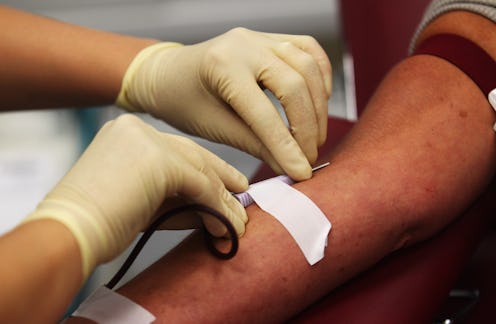News
An Obstacle Preventing Gay Men From Donating Blood
As it said it would do late last year, on Tuesday the Food and Drug Administration proposed new rules that would end a ban on gay men donating blood, the Associated Press reported. But while it's being hailed by many in both the gay community and among medical professionals as a step in the right direction, it still contains a major restriction that the LGBT community is decrying: Only gay men who have not had sex with another man within the last year are eligible to donate.
Previously, the restriction was much longer: Any man who had ever had sex with another man since 1977, when the AIDS epidemic began in the U.S., was barred from donating. Why? While all donations in the U.S. are screened for the HIV virus, there is a window of about 10 days between infection and when the virus can be detected in a blood test, according to the AP. So it's not totally clear why the FDA decided such a lengthy waiting period was necessary for gay and bisexual men.
David Stacey of the Human Rights Campaign said in a statement that the new FDA guidance "falls far short of a fully acceptable solution because it continues to stigmatize gay and bisexual men." Stacey added that the continuation of the ban could not be justified "in light of current scientific research and updated blood screening technology."
Democratic Sen. Tammy Baldwin of Wisconsin, a strong supporter of changing the gay blood donation ban, told the Huffington Post on Tuesday that she was encouraged by the FDA's action, but that it didn't go far enough. Blood donations policies should be based on individual risk factors, Baldwin said, and not single out one specific group.
The National Gay Blood Drive was formed in 2012 to bring attention to the ban. On the day of the national event, which this year is scheduled for July 10, participants bring substitutes to blood banks to donate in their place. On Tuesday, founder Ryan James Yezak issued a statement on the group's website, supportive of the FDA "for taking this huge first step." But, like many others, Yezak said there is still work to be done. "We will continue to encourage the FDA to consider all the evidence until they arrive at a non-discriminatory policy and discrimination based on sexual orientation is eliminated from the blood deferral process altogether."
The new FDA recommendations are now open to a 60-day comment period by the public before taking effect, so it's possible the agency will hear the voices of those who are pointing out that the ban shouldn't just be reduced, but lifted entirely.
